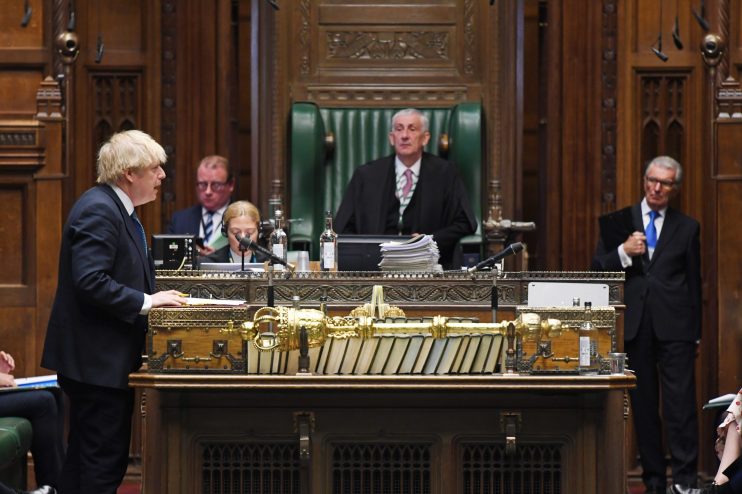‘A weekly test of showmanship’: Does PMQs shape public opinion?

The greatest representation of Westminster’s gladiatorial spirit has to be Prime Minister’s Questions (PMQs).
MPs pack themselves onto the House of Commons benches every sitting Wednesday to watch and engage in the high political drama, which often has the feeling of a schoolyard brawl.
The screeching interjections, snide personal attacks and fits of laughter from puce-faced MPs only add to the feelings of tribal warfare.
Since becoming Labour leader, Sir Keir Starmer has been lauded for his efforts at PMQs among the political commentariat, who love to use that already cliched adjective to describe his performances.
Forensic.
His sober and measured tone has been suited to the new socially distanced arena, giving the former human rights lawyer ample time and space to pick apart Boris Johnson and his deputies over their response to Covid-19.
After just a handful of sessions, Starmer’s performances have got many Labour supporters and media outriders cooing about his leadership abilities.
While it is certainly possible – if not probable – that we will see the opposition leader monster the Prime Minister every week at PMQs for the next five years, will it even matter for those outside the SW1 bubble?
While the Westminster press gallery may revel in the political bloodsport, does anyone with hobbies outside watching old Michael Cockerell documentaries actually care?
Former political editor of The Sun George Pascoe-Watson said any effect PMQs has on the public is indirect.
“The real point of PMQs is party management in either government or opposition,” he says.
“It’s a weekly test of showmanship, of whether somebody is sharp, whether they have flexibility, humour and a sense of flair.
“When you’re a prime minister with a small majority, or no majority like in Theresa May’s case, a good performance can you can get through the week and give your MPs a spring in their step.”
Former Conservative leader William Hague was renowned for his abilities at the despatch box, consistently gaining the upper hand over Tony Blair between 1997 and 2001.
Tory peer and journalist Lord Daniel Finkelstein and former chancellor George Osborne prepared Hague for PMQs every week while he was opposition leader.
The special advisers would spend hours on Tuesday night and the entirety of Wednesday morning strategising for PMQs with the opposition leader.
The trio would role play potential scenarios, with Osborne – who Finkelstein assures me can do excellent impressions – pretending to be Blair.
Finkelstein is still awestruck by Hague’s preternatural ability as a House of Commons performer.
“Nobody was like Hague,” he says.
“As a prime minister, Blair was very hard to beat, but Hague is the best I’ve seen.
“Blair and Hague’s speed of thought was just incredible to watch…I think that most people would agree that they were something to behold.”
Ultimately, it mattered little to the general public – Blair clobbered the Conservatives in the 2001 election and walked away with a 167-seat majority.
Before the Open newsletter: Start your day with the City View podcast and key market data
Finkelstein said that PMQs primarily affects perceptions among MPs, political operatives and journalists, which can then have a knock-on effect to the general public.
In Blair’s case, he was among the most popular first-term prime ministers ever and PMQs was never going to make much of a difference come polling day.
“PMQs may have an impact on party confidence in the leader, which can have other knock-on effects,” Finkelstein says.
“You really have to be able to distinguish between signal and noise – there are lot of fantastic moments, but they often don’t mean anything.”
Former Ed Miliband adviser Tom Hamilton said PMQs often reinforces how the public already see a prime minister or opposition leader.
Hamilton, who co-wrote Punch and Judy Politics: An Insiders Guide to Prime Minister’s Questions, said this happened on several occasions during Miliband’s battles with David Cameron.
One example was when Cameron referenced the Labour leader’s narrow victory over his brother, and former foreign secretary, David in the party’s 2010 leadership election.
When asked about speculation that Cameron would sack his foreign secretary in 2011, the Prime Minister responded: “There’s only one person I can remember around here knifing a foreign secretary and I think I’m looking at him.”
“That comment just reiterated the feeling that Ed was a second choice for the leadership and was meant to carry through to the public that he was a bit weird,” Hamilton says.
Hamilton believes that these sort of exchanges can impact public opinion, with the parliamentary press gallery acting as a conduit.
“It does filter through to a wider group, because all of the MPs and reporters watch it,” he says.
“It does end up influencing the tone of reporting, which carries forward to other reporting and narratives around leaders.”
So, where then does all this leave the current Labour leader?
Pascoe-Watson said Starmer would do well to use PMQs to establish himself in the minds of voters as a safe pair of hands.
“He doesn’t need to be Elton John up there – he just needs to be competent and ask good questions,” he says.
“He just needs to be be competent, and not be Jeremy Corbyn, and then wait for the government to fall over.”